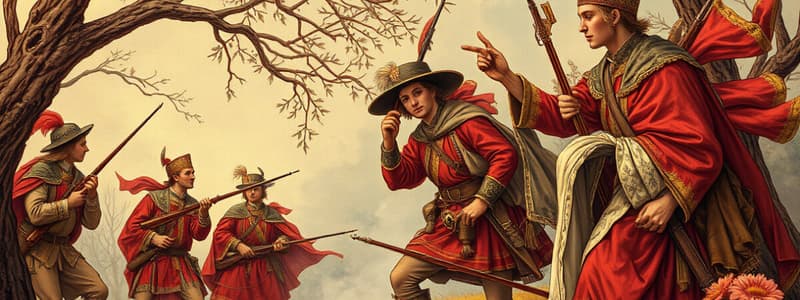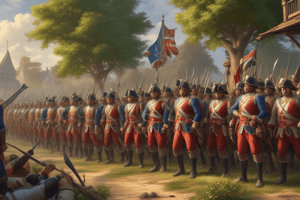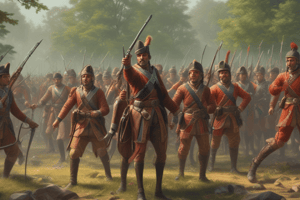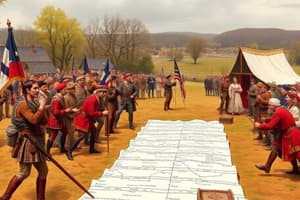Podcast
Questions and Answers
What was the French & Indian War?
What was the French & Indian War?
- A naval battle
- A war for independence
- Conflict between France and Great Britain (correct)
- A land dispute solely in Europe
What were militias primarily composed of during the 1700s?
What were militias primarily composed of during the 1700s?
Civilian soldiers, mostly farmers
What was the Albany Plan of Union intended to address?
What was the Albany Plan of Union intended to address?
If the French attacked, other colonies would help defend.
Who authored the Albany Plan of Union?
Who authored the Albany Plan of Union?
What was the purpose of the Treaty of Paris?
What was the purpose of the Treaty of Paris?
What did the Proclamation of 1763 prevent?
What did the Proclamation of 1763 prevent?
What was Pontiac's Rebellion?
What was Pontiac's Rebellion?
What does the term 'revenue' refer to?
What does the term 'revenue' refer to?
What is a resolution in a formal context?
What is a resolution in a formal context?
What does it mean to boycott?
What does it mean to boycott?
What does repeal mean?
What does repeal mean?
What were writs of assistance?
What were writs of assistance?
What is nonimportation?
What is nonimportation?
Who were the Sons of Liberty?
Who were the Sons of Liberty?
Who was Samuel Adams?
Who was Samuel Adams?
Where did the American Revolution start?
Where did the American Revolution start?
What was the Sugar Act?
What was the Sugar Act?
What does smuggling refer to?
What does smuggling refer to?
What was the Stamp Act?
What was the Stamp Act?
What did Patrick Henry famously say?
What did Patrick Henry famously say?
What were the Townshend Acts?
What were the Townshend Acts?
What does 'Taxation without Representation' mean?
What does 'Taxation without Representation' mean?
What was the Boston Massacre?
What was the Boston Massacre?
What is propaganda?
What is propaganda?
What was the committee of correspondence?
What was the committee of correspondence?
What was the Tea Act?
What was the Tea Act?
What was the Boston Tea Party?
What was the Boston Tea Party?
What were the Intolerable Acts?
What were the Intolerable Acts?
Who was King George III?
Who was King George III?
What is an effigy?
What is an effigy?
What was the Continental Congress?
What was the Continental Congress?
What was the Second Continental Congress?
What was the Second Continental Congress?
What was the Continental Army?
What was the Continental Army?
Who was George Washington?
Who was George Washington?
What was the Olive Branch Petition?
What was the Olive Branch Petition?
What is Common Sense?
What is Common Sense?
Who authored the Declaration of Independence?
Who authored the Declaration of Independence?
What did the Declaration of Independence officially declare?
What did the Declaration of Independence officially declare?
What significant event occurred on July 4th, 1776?
What significant event occurred on July 4th, 1776?
Study Notes
Key Events and Concepts
- French & Indian War: A conflict from 1754 to 1763 between France and Great Britain over territorial claims in North America.
- Militia: Civilian soldiers primarily composed of farmers during the 1700s, crucial for local defense.
- Albany Plan of Union: Proposed in 1754, it emphasized collective colonial defense against French attacks, marking the first united approach among the colonies.
- Treaty of Paris: Signed in 1763, this peace agreement formally ended the French & Indian War, redrawing territorial lines in North America.
British Policies and Colonial Responses
- Proclamation of 1763: Issued post-war, it forbade colonists from settling west of the Appalachian Mountains to reduce conflicts with Native Americans.
- Pontiac's Rebellion: A Native American resistance (1763) led by a chief in Michigan, advocating for unity against European incursion.
- Revenue: Refers to incoming money, which became a significant focus for British taxation policies post-war.
- Taxation without Representation: A central grievance for colonists, highlighting their lack of representation in British legislative decisions.
Acts and Protests
- Sons of Liberty: A group of male colonists who actively protested against British taxation, employing both nonviolent and violent methods.
- Sugar Act (1764): Reduced taxes on molasses to deter smuggling, initiating discontent over taxation practices.
- Stamp Act (1765): Imposed taxes on printed materials, inciting widespread anger that led to protests.
- Boston Massacre (1770): An incident where British soldiers killed five civilians, portrayed as a massacre by colonial media to rally support against British rule.
- Tea Act (1773): Taxed tea to support the British East India Company, leading to significant colonial boycotts.
Significant Events and Figures
- Boston Tea Party: A direct action protest against the Tea Act where Sons of Liberty dumped tea into Boston Harbor, symbolizing resistance.
- Intolerable Acts (1774): A series of punitive laws aimed at Boston, which included closing the harbor and enforcing a police state.
- George Washington: Appointed as the commander of the Continental Army by the Second Continental Congress.
- Thomas Jefferson: Authored the Declaration of Independence, denoting the formal separation of the colonies from Britain on July 4, 1776.
Organizations and Communicative Efforts
- Continental Congress: Formed in 1774 to organize colonial resistance, establishing militias to defend colonial interests.
- Second Continental Congress: Convened in 1775, it led to the formation of the Continental Army and drafted the Olive Branch Petition in a last attempt for reconciliation.
- Propaganda: Utilized to influence public opinion and garner support for the colonial cause, often presenting one-sided narratives.
- Committee of Correspondence: A network for sharing information and coordinating resistance strategies among the colonies, fostering unity.
Ideals and Literature
- Common Sense: A pamphlet by Thomas Paine advocating for independence and encouraging revolution among the colonists.
- Resolution: A formal expression of opinion or will, often used in the context of political actions and decisions during this era.
Resistance Acts
- Boycott: A refusal to purchase British goods as a method of protest against taxation.
- Repeal: The act of canceling a law or legislative act, a frequent demand among colonists during the protests against oppressive British policies.
- Writs of Assistance: Legal documents allowing tax collectors to search private properties for smuggled goods, inciting fear and resentment among colonists.
Cultural Symbols
- Effigy: A symbolic rag doll often used in protests to represent and decry figures such as tax collectors or British officials.
Studying That Suits You
Use AI to generate personalized quizzes and flashcards to suit your learning preferences.
Description
Test your knowledge of Chapter 5: The Spirit of Independence with these flashcards. Explore key terms such as the French & Indian War, militia, and the Albany Plan of Union. Perfect for reinforcing your understanding of early American history leading up to independence.




